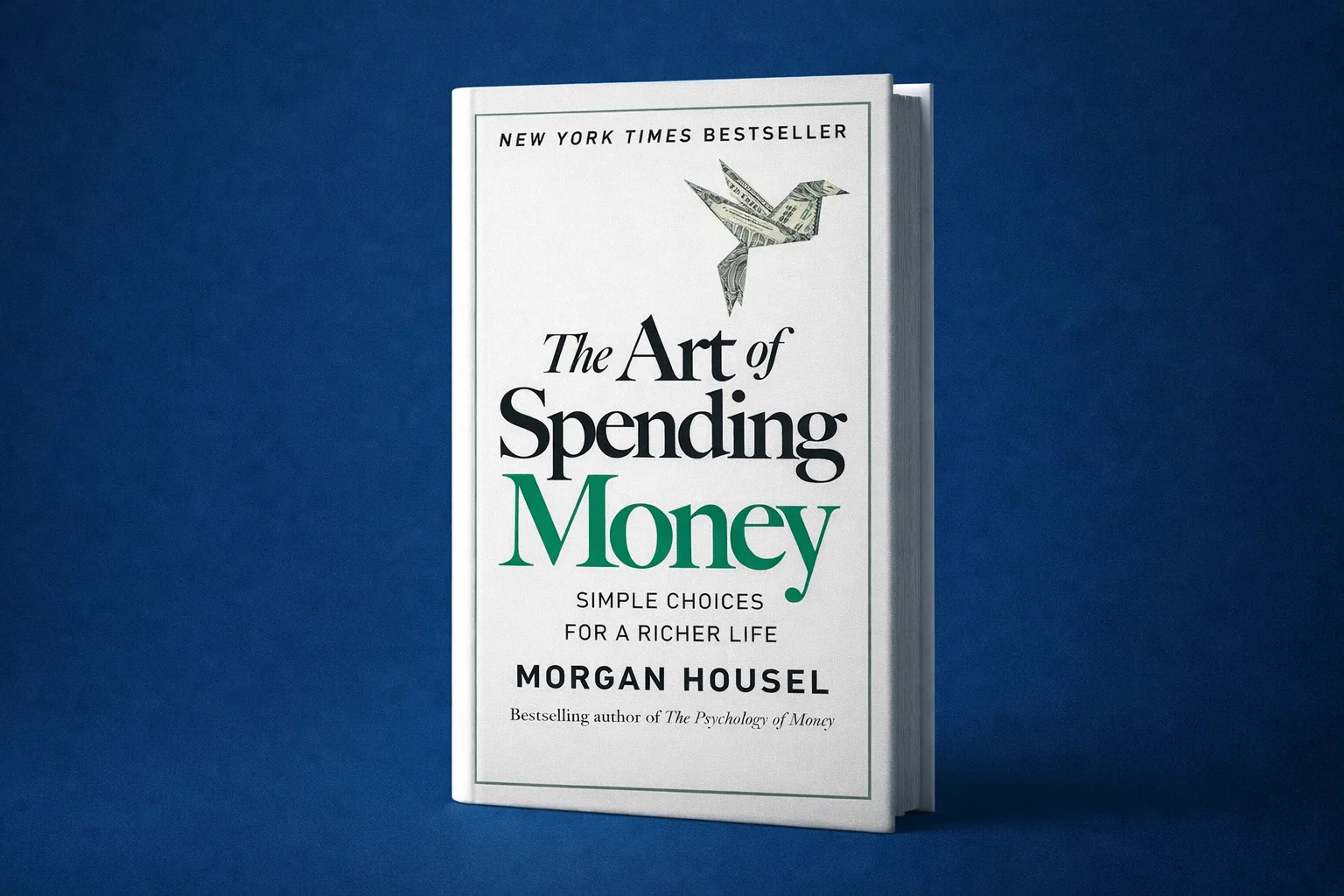The Art of Spending Money

We’re taught how to make money, but rarely are we taught how to use it to build a happier life. This gap between earning and fulfillment leaves many people confused. We achieve financial success only to find it doesn’t deliver the satisfaction we expected.
Dr. Dan Goodman, a LASIK surgeon, once treated a woman who returned for a checkup despondent, claiming the surgery had ruined her life. Her vision was perfect, but she had expected that losing her glasses would make her husband find her more attractive and her coworkers see her as more intelligent. When she realized that love and respect weren’t driven by something so superficial, she was crushed.
“You have a problem I can’t help you with,” Goodman told her. “I’m sorry I didn’t realize it earlier.”
This is a powerful metaphor for our relationship with money. We often pursue it expecting it to solve problems it was never designed to fix.
In his new book, The Art of Spending Money, Morgan Housel argues that money is less about numbers and spreadsheets and more about psychology—the stories we tell ourselves about what matters. It’s a tool that can build a better life, but only if we understand how to use it.
This article distills four of the most surprising and impactful takeaways from the book into a clear guide for using money to build a more meaningful life.
1. You Don’t Actually Want a Nicer Car. You Want Respect.
One of the most counter-intuitive truths about spending is that the desire for luxury items is often a proxy for a much deeper human need: the desire for respect and admiration from others. We think a bigger house or a faster car will earn us the esteem we crave.
This is not a new phenomenon. In 1759, the economist Adam Smith argued that the relentless pursuit of wealth is driven primarily by vanity—the desire “to be observed, to be attended to.”
It is the vanity, not the ease, or the pleasure, which interests us.
The problem is that using material possessions to gain respect is an ineffective strategy. The novelty of a new purchase wears off quickly, both for you and for others. More importantly, it fails to impress the people whose respect you likely value most. Your family and close friends admire you for your kindness, humor, and intelligence—not the logo on your shirt or the horsepower of your car.
Columnist David Brooks distinguishes between “resume virtues” (your job title, your net worth) and “eulogy virtues” (how much people loved and respected you). We are socially pressured to chase the former, but it’s the latter that defines a successful life. As Warren Buffett once said, the ultimate measure of your life is how many of the people you want to love you actually do. That is a form of wealth that can’t be bought.
2. Happiness Is When Nothing Is Missing, Not When You Have Everything.
Financial happiness isn’t about accumulation; it’s about contentment. Housel explains that true happiness is simply the gap between what you have and what you want. The smaller that gap, the happier you are.
He tells the story of his grandmother-in-law, who lived on a meager Social Security check and was technically on the verge of poverty. Yet, she was one of the happiest people he knew. Why? Because she had little but wanted even less. He contrasts her with billionaires he has met who were less happy because their desires always outpaced their assets.
This endless cycle of wanting more is a “dopamine trap.” Our brain doesn’t actually want stuff; it wants the anticipation of getting new stuff. The excitement is in the chase, not the acquisition. This is similar to actor Will Smith’s description of fame: Becoming famous is amazing. Being famous is a mixed bag. Losing fame is miserable. The change, not the amount, is what matters. This is why the goalpost always moves. The dream of a $10,000 car, once achieved, gives way to the dream of a $100,000 car, and so on.
Wealth, then, isn’t an absolute number. It is the gap between what you have and what you want. This reframing highlights that desiring less can have the same impact on your well-being as earning more, but it’s a game you can actually win.
As Irish novelist Iris Murdoch once wrote:
People from a planet without flowers would think we must be mad with joy the whole time to have such things about us.
3. Being “Rich” Can Be a Curse. Aim to Be “Wealthy” Instead.
Housel makes a critical distinction between being rich and being wealthy.
- Rich: Having money to buy the things you want.
- Wealthy: Having control over what that money does to your personality, your freedom, and your mental health.
The Vanderbilt family is a prime example of a family that was incredibly rich but not wealthy. Their lives were controlled by their money, which fueled a miserable existence of social competition, rivalry, and insecurity. One Vanderbilt heir quipped that socialites don’t “devote themselves to pleasure regardless of expense,” but rather “devote themselves to expense regardless of pleasure.” They used their fortune not as a tool for a better life, but as a yardstick for social status, which left them in a perpetual state of anxiety. As William Vanderbilt lamented:
Inherited wealth is a real handicap to happiness. It is as a death to ambition as cocaine is to morality.
This generational curse found a modern resolution in one of the family’s most successful descendants: broadcast journalist Anderson Cooper. As a Vanderbilt heir who was never promised a fortune, Cooper considers inherited wealth a “curse” and an “initiative-sucker.” Free from the obligation to serve his money, he was able to build his own life, achieving a level of purpose the prior generations never could.
Contrast their story with that of Chuck Feeney, the billionaire co-founder of Duty Free stores who gave away his entire fortune before he died. Feeney tried the high life—luxury apartments, yachts, private jets—and quickly realized it didn’t make him happy. Instead, he chose to use his money as a tool to pursue what did bring him fulfillment: philanthropy. He achieved true wealth by gaining control over his life and his money.
The lesson is clear: Money is a powerful tool, but if you’re not careful, it will use you. The goal isn’t to build your life around money, but to use money to build your life.
4. The Single Best Thing Money Can Buy Is Control Over Your Time.
There is no such thing as “unspent” money. Every dollar you save isn’t sitting idle; it has been actively spent on purchasing something invaluable: independence.
This is the highest return on investment your money can provide—the ability to do what you want, when you want, with whom you want. It’s the freedom to control your own schedule and your own life.
Consider the financial lives of two professional athletes. NBA player Antoine Walker made $108 million over his career and filed for bankruptcy. By contrast, NFL player John Urschel earned far less but saved most of it, which gave him the freedom to retire early from football and pursue a Ph.D. in mathematics at MIT. Which life do you admire more? Most people would choose Urschel’s, because what we truly desire is not just money, but the control over our lives that it can provide.
Housel writes that “Wealth without independence is a unique form of poverty.” Every dollar saved pushes you up the spectrum of financial independence. It’s not an all-or-nothing goal; it’s a ladder with many rungs, each one offering a bit more freedom. Here are a few key levels:
- Level 1: Basic Buffer. Enough savings to cover small, run-of-the-mill problems without stress.
- Level 2: Crisis Coverage. Enough to handle a larger, unforeseen problem like a major car repair or job loss without going into debt.
- Level 3: Career Flexibility. The freedom to quit a terrible job and take the time you need to find a better one.
- Level 4: Supplemental Income. Passive income covers a meaningful portion of your living expenses, reducing stress and reliance on a single paycheck.
- Level 5: Financial Independence. Your investments can cover your basic living expenses indefinitely. Work becomes a choice, not a necessity.
- Level 6: True Autonomy. You can spend your time doing what you want, with whom you want, for as long as you want, unconcerned with what others think.
Each step up this ladder gives you more control over your life right now, not just in some distant future.
Conclusion: Your Own Simple Life
The art of spending is about understanding our own psychology. It’s about recognizing that we truly seek respect, not just status; that contentment is the key to happiness; that true wealth is control, not just cash; and that the highest purpose of money is to buy our own independence.
The luckier you are, the nicer you should be. Having money can accentuate who you are, but it can also blind you to who others are. The ultimate goal is not just to acquire wealth, but to use it as a tool for empathy and understanding. As William Dawson wrote over a century ago in The Quest of the Simple Life, the ideal is a life where money serves you, not the other way around.
This doesn’t mean you must live a life of extreme frugality. It means consciously choosing your life, rather than letting money and social pressure choose it for you. It means building your own “simple life”—one grounded in who you are and what truly matters, regardless of your financial standing.
Morgan Housel is a partner at The Collaborative Fund and a former columnist for The Motley Fool and The Wall Street Journal. He has won the Best in Business Award twice from the Society of American Business Editors and Writers, received the New York Times Sidney Award, and was twice a finalist for the Gerald Loeb Award for Distinguished Business and Financial Journalism. He is also the bestselling author of The Psychology of Money, Same As Ever, and The Art of Spending Money. Morgan lives in Seattle with his wife and two children.
Book details
- Title: The Art of Spending Money
- Explanatory Title: Simple Choices for a Richer Life
- Author: Morgan Housel
- Publisher: Harriman House
- Publication Date: October 7, 2025
- Print Length: 272 pages
- ISBN-10: 1804091898
- ISBN-13: 978-1804091890
- Category: Personal Finance Budgeting / Professional Finance

